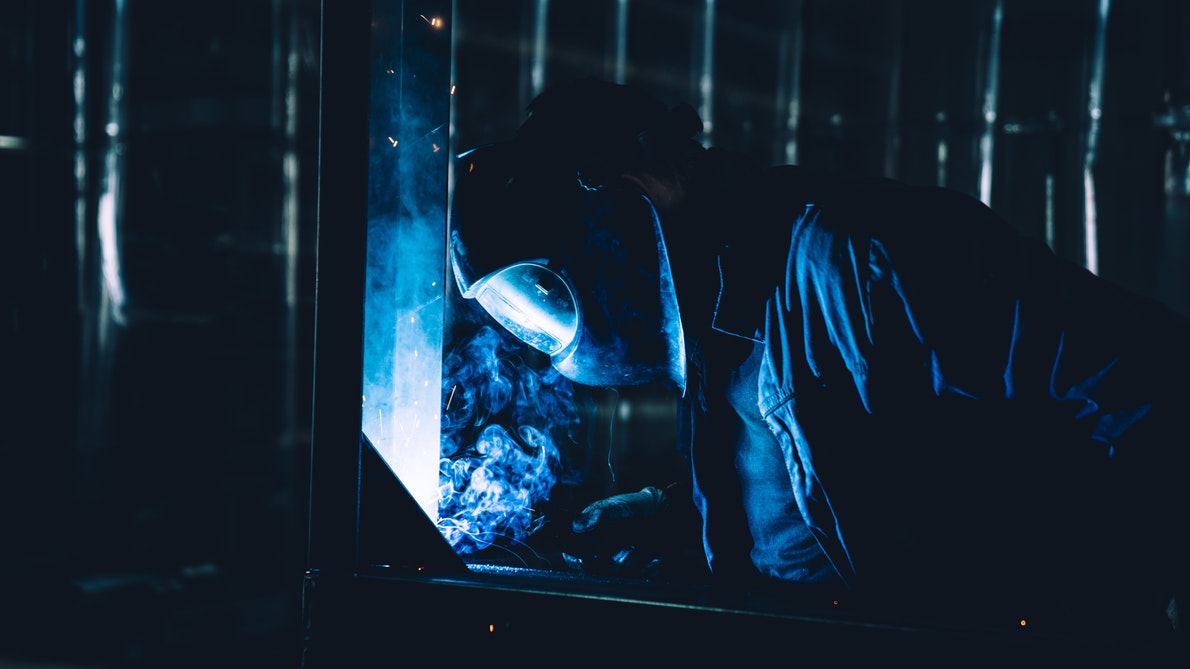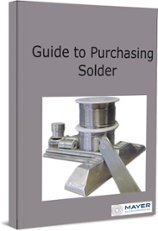Soldering Guide for Industry
Chapters
All About Solder
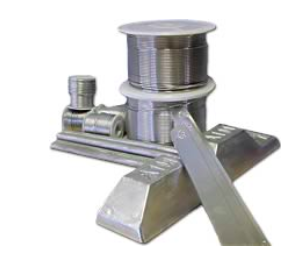 Solder is a fusible metal alloy used to create a permanent bond between metal workpieces. Solder must be melted in order to connect the pieces together, so a suitable alloy for use as solder will have a lower melting point then the pieces it's intended to join. Soft solder has a melting point range from 90℃ to 450℃ (190℉ to 840℉).
Solder is a fusible metal alloy used to create a permanent bond between metal workpieces. Solder must be melted in order to connect the pieces together, so a suitable alloy for use as solder will have a lower melting point then the pieces it's intended to join. Soft solder has a melting point range from 90℃ to 450℃ (190℉ to 840℉).
To solder metals together a soldering gun or soldering iron is used which will melt the solder wire so that it can flow into the joint of the metals and fuse them together in a semi-permanent bond. Solder is commonly used for electronics, plumbing, roofing, automotive, stained glass and jewelry. Solder wire is available in a range of thickness for hand-soldering, it is also available as a paste or foil shaped. Plumbers often use bars of solder, much thicker than the wire used for electronic applications. Jewelers often use solder in thin sheets, which they cut into snippets.
Lead Solder
Most prevalent solder that is used is tin-lead solder that was mixed to such a degree that it is known as a eutectic mixture. Tin-lead solder, also called soft solder, is commercially available with tin concentration. The greater the tin concentration, the greater the solder’s tensile and shear strengths. The addition of tin improves the wetting properties of the alloy, lead itself has poor wetting characteristics.
Lead-Free Solder
With the drive to reduce the amount of lead being used for environmental and health reasons, lead-free solder is now being widely used. To increase the safety of people working regularly with these materials there has been a move to make lead-free solders compulsory in industries where they are used. Traditional tin/lead solder is being replaced by other types of lead-free solder.
Lead-free solder in commercial use may contain tin, copper, silver, bismuth, indium, zinc, antimony and traces of other metals. Most lead-free replacements for conventional 60Sn/40Pb have a melting point from 5 to 20℃ higher than their lead-based counterparts, though there are also solders with much lower melting points.
It is used a lot in plumbing and with recent innovations is also an integral part of all sorts of electronics. Lead-free solders are less hazardous to people and much more friendly to the environment where waste is concerned.
Rosin and Acid Core Solder
Rosin and acid solders are manufactured with the solder wire as a tube and the center of the tube contains the flux. Rosin core solder contains a mild flux and its designed to solder parts where flux residue cannot be removed. It can be used in electric circuit boards or electrical connections.
Rosin flux residue is non-corrosive which eliminates the need for post-solder cleaning. If you are joining wire or metals that operate under extreme conditions of temperature where fluctuations vary between cool to very hot, then most likely rosin core solder would be used.
When using an electrical soldering iron for fine jobs, then rosin core solder would suit the purpose, but you would need the thicker gauges where you are using blow torch methods.
The acid core solder is an aggressive type designed to solder steel to other metals. It is manufactured with a special type of chemical that helps for the solder of difficult types of metals. The acid core in the solder can be said to clean the oxidation off the metal, making for a satisfactory joint. Acid flux is used for metal mending and plumbing and rosin flux is used in electronics.
Forms of Solder
Solder comes in all different types of forms and shapes. Depending on what you need the solder for there are different forms in which you can have your metal delivered. A lot of this depends on what industry you are in, what metals you’re working with, and what type of project you’re working on.
Some of the shapes that are available are:
-
Anodes
-
Balls
-
Bars
-
Cakes
-
Cathodes
-
Cut Bars
-
Cut Cathodes
-
Foil
-
Flux
-
Granules
-
Ingots (regular & small)
-
Pellets
-
Pigs
-
Powder
-
Rod
-
Sheet
-
Shot (Polished, Unpolished)
-
Slabs
-
Waffle
Industries That Use Solder
Every industry has standards of what metal alloys are commonly used. We have listed some of the major industries that commonly use solder.
Plumbing 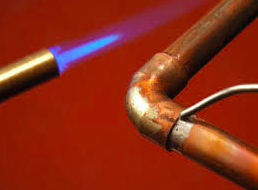
No plumbing system, no matter how well designed, can be expected to operate safely or hygienically if the products or materials used are unsatisfactory. The durability of a plumbing system is based on the quality its component parts and assembly skills of those who installed it. The materials they use must be able to withstand external pressures if they are to be buried. The impact of environmental factors such as heat, cold, expansion, contraction, corrosion, pH, and bacteria levels also need to be considered. As well as having the good materials in order to create a well-done plumbing system, most industrialized countries have national standards or codes that set out the minimum requirements for the material specifications.
Metal alloys far exceed the performance specifications of their respective parent materials. Some of the alloys used are 95Sn/5Sb, and 97Sn/3Cu. Solder joints are used for potable water systems and plumbing repair. When you are joining galvanized pipes it is suitable because the acid core flows into joints allowing the melted metal to thoroughly seal the clean joints.
Radiators 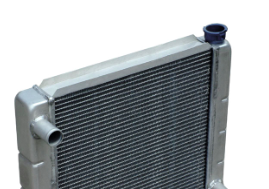
Radiator solder can be similar to plumbing in that no matter how well designed your radiator, it will not hold up if you don't use the right materials. Since different designs lead to differences in cooling ability, it is important to know what those differences are knowing the characteristic of metals in relation to your design concepts. You would need supplies to repair and assemble radiators, heaters and gas tanks. When trying to decide what metals to use, you have to look at the materials cost, the longevity or lifespan, and if repairing what the original radiator is made of, some examples of materials used in this industry include 15Sn/85Pb, 20Sn/80Pb, 30Sn/70Pb, 25Sn/65Pb and 40Sn/60Pb as well as aluminum and copper.
Stained Glass 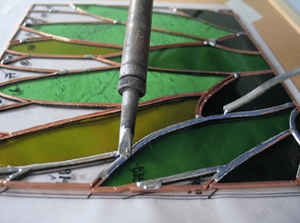
When working with stained glass you need to make sure you are using high-quality solder because stained glass is a work of art. Solder is one of the essential tools when working with stained glass. It is used to join glasses to other glasses, ceramics, and metals. It is recommended in the stained glass industry to get 60Sn/40Pb but you can also use 50Sn/50Pb and 63Sn/37Pb depending on what you are working on.
The different types of solder used in stained glass soldering are:
-
50/50 solder is most commonly used inox and lamp assembly.
-
60/40 is most commonly used in lead and copper foil assembly.
-
63/37 is most commonly used for decorative soldering.
It is important to not use acid or rosin core solder for stained glass, only use solid-core solder. Materials used in the stained glass industry can also be used to create and restore stained glass windows, lamps, suncatchers, cabinets and doors. To use solder you must use a soldering iron that melts the solder to a liquid state (approximately 700 ℉). As well it is important to wrap each piece of glass in copper foil or lead came because the solder will not stick to glass alone.
Jewelry/Figurines 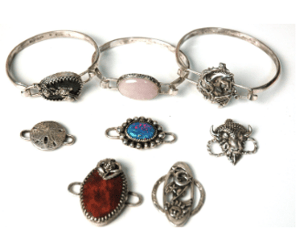
Solder in jewelry making is a metal alloy of silver and copper or silver and zinc and is used to join two pieces of metal together. When creating jewelry and figurines you need to look for quality and wear when looking at metals to use. You have to look at what kind of jewelry you are making. The products produced in the industry are pewter figurines, earrings, necklace, bracelets, and games. Examples of these materials include Sn/Sb/Pb Alloys and lead-free, pewter alloys.
The two standard types of soldering used in the jewelry-making field are soft soldering and hard soldering. Soft solder is commonly used for stained glass styles. This is a low temperature melting solder and you use a soldering iron when working with it. Soft solder is easier to work with than hard solder but the bond that is created is not as strong as hard solder. Hard solder is commonly used to unite precious metals together. This is a high temperature melting solder and you need to use a torch when working with it. If you are doing a complex piece it is best to work with hard solder then work your way down solders as needed.
To create a good blend of solder with the surrounding silver, work with the highest temperature solder possible. Low-temperature solder does not blend as well as high-temperature solder. Also, make sure to select your solder shape based on the job you are working on. Wire, paste and sheet solder are better for certain projects. Sheet solder can cover large areas and lays better on flat surfaces. Wire solder works better when working in smaller areas and when you need more precision.
Bait and Tackle
In the bait and tackle industry solder is used for many things including hooks, wire, bead, bladers, ball bearing, rings, loops, spacers, jigs, splits, sinkers and cannon balls. Typically materials include pure lead and antimonial lead alloys both are available in bar and wire form.
Wire Cloth 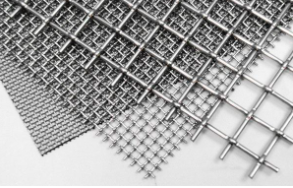
Wire cloth materials and mesh for screens are used in many of your mechanical and industrial needs. Wire cloth is suitable for a number of applications and industries. Examples of some uses of wire cloth for industrial needs are cryogenic heat exchangers, chimney caps, breather vents for solar need, as well as security and automotive industries. In the food industry wire cloth is used for drying, grilling and fish traps. Some examples of home uses of wire cloth are renovation projects and decorating, pest control and gardening. There are a variety of wire cloth varieties available, including 50Sn/50Pb wire, 60Sn/40Pb wire, and 95Sn/5 wire.
Automotive 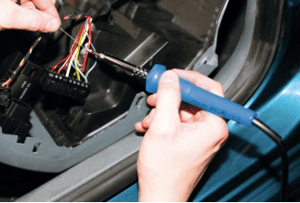
Car manufacturers need durable materials in order to produce high-quality vehicles people will want to buy. In order to keep an automobile running to a standard, you need the right materials for the job. Soldering materials can be used for armatures, wire harness, car electrical systems and other parts required in the automotive industry. Strong alloys are commonly used in this industry. Custom and restoration body shops utilize soldering materials to fill seas, level uneven bodywork, and blend custom features into vehicles.
Medical
Medical equipment is becoming more and more advanced and new technologies are being created daily. Having advanced medical equipment is essential to making sure your medical practice is up to speed. New technologies and longer lifespans are driving the growing medical device and medical electronics manufacturing markets around the world.
Solder is commonly used in some of these products:
-
The assembly of diagnostic and therapeutic catheters, micro-catheters and feed-through require precision solder products that are made to a tight tolerance and high-quality standards.
-
In sensors, temperature-sensitive devices may need low melting alloys to prevent thermal stress during assembly.
-
Soldering to some of the most widely used metals in the medical market, including Nitinol and stainless steel can be challenging. Removal of the tenacious surface metal oxides must be achieved before soldering can take place.
-
In connector manufacturing maximum
signal integrity is required to allow for the optimum flow of data and images. -
From diagnostic and imaging equipment to handheld monitoring devices, printed circuit boards are in almost all of the equipment used by doctors, hospitals and clinics.
-
Lead is a dense and extremely versatile tool, making it the preferred material of high energy radiation operation. It is used in nuclear and radiology operations, including x-ray gamma ray and nuclear applications.
Some of the solder products frequently used in medical devices are
How to Purchase Solder

When looking what kind of solder you are going to use you have to look at what you are soldering and what the industry standards are within the particular industry you are working in. Solder comes in various thicknesses, and you’ll need to have several different thicknesses on hand for different types of work. You will use the 0.032” for most work, but the thick type (0.062”) comes in handy for soldering larger stranded wires - and the fine solder (0.020”) is useful for delicate soldering jobs on small components. If you have any questions about your specific solder requirements, please contact us 888-513-7271 or email us at sales@mayeralloys.com. We provide FREE technical assistance and will be happy to answer any questions you may have.
If you are currently interested in purchasing solder, Mayer Alloys stocks and supplies a full line of the highest quality, non-ferrous metals specializing in
Mayer Alloys
Mayer Alloys is a solder distributor that stocks and supplies a complete line of solder. We are located in the Detroit Metro Area and supply solder all over in country including Warren, Ann Arbor, Grand Rapids, Flint, and Chicago. As the Master Distributor for AIM Solder, all material we stock and supply is guaranteed and certified to comply with ISO 9001 standards.
Mayer Alloys stocks a full line of the highest quality, non-ferrous metals specializing in tin and lead-based alloys, and lead-free alloys for manufacturing and/or fabrication. We will ship your items the same day it is ordered in most cases. Customer service and technical assistance are always available to ensure you are getting the right materials. For technical support, please contact us at 888-513-7971 or email us at sales@mayeralloy.com.

